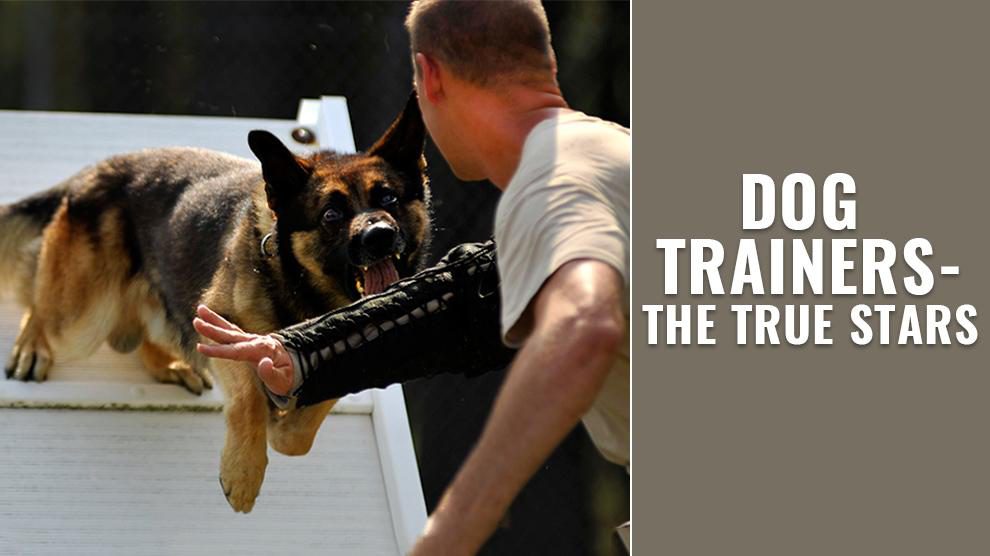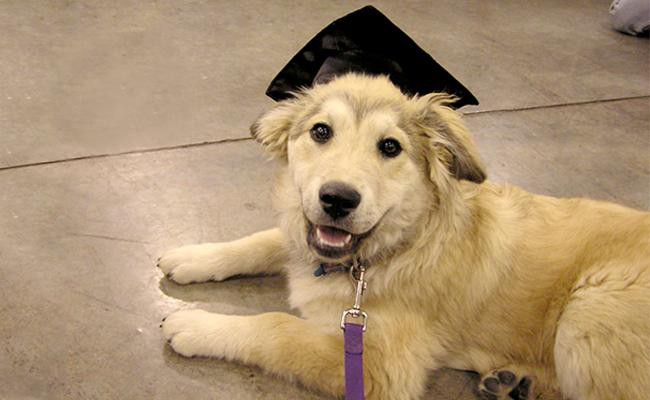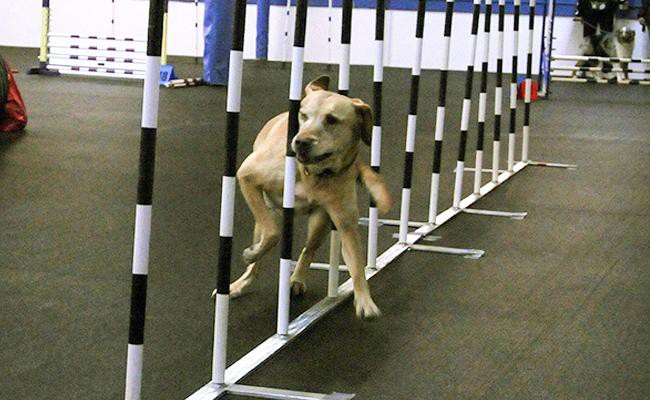- Education Matters
- Positive Training
- What’s A Good Training Schedule?
- Initial Assessment
- Is Apprentice Important?
- Owner’s Presence Makes The Difference
- Humor Is Cool
- Patience Is The Most Valued Virtue In The World Of Dog Training
- Quality References
- Who Actually Hires Dog Trainers?
- Where To Start?
- What’s The Main Difference Between A Dog Behaviorist And A Dog Trainer?
- Dog Trainer Salary
Dog Pregnancy Calculator And Timeline
A well-disciplined dog is a joy to move along and consistent dog training helps confirm that your puppy can take part in any event you participate. That’s a unanimously agreeable fact.
Dog trainers play a major role in helping your puppy behave obediently.
Puppies can easily begin simple training when they are around 8 weeks of age.
Whether your goal includes taking part in dog sports or puppy socialization, training is important to make your puppy more comfortable and confident.
It’s amazingly fun for both dogs and people.
Education Matters
A dog trainer should definitely have the requisite qualifications and knowledge to train.
There are not many colleges that offer a specialized degree in “dog training” at any top universities in the United States of America.
A degree in allied fields such as veterinary sciences, ethology, or behavioral psychology will definitely help.
Moorpark College (Moorpark’s training zoo) provides a program in management and animal training.
The emphasis in this program is mainly exotic animals, and entire concentration is not on domestic dogs.
Another related program, University of North Texas, Denton offers a course in behavioral modification using positive reinforcement shaping.
Students do their practical training at animal shelters, home, and at zoos.
For both undergraduates and graduates, training a pet becomes a course requirement.
Positive Training
A bad trainer depends on harsh training methods such as the use of electric collars, choke chains, and prong collars.
They will, most likely, will inflict corporal punishment and intimidate your dog.
A well-qualified and trained dog trainer will only use progressive reinforcement techniques, dog-friendly, and gentle means instead.
These trainers will concentrate on behaviors which are advised by experts, manage and alter all sorts of behavioral problems.
What’s A Good Training Schedule?
The main subjects covered in any dog training program should include-
History – A complete dog training history from the 19th century onwards. Contrast and comparison of dog training.
Dog behavior – The main area of interest include dog breed characteristics, hormonal influences, critical periods, social development, body language, social signals, fixed action patterns, genetics of behavior, dog ethology and also development.
Animal learning – Operant and classical conditioning, negative and positive reinforcement, negative and positive punishment, conditioned emotional responses, establishing operations, motivation
Designing classes – How to handle owners or handlers, counsel individuals. Volunteering with local rescue groups and shelters is amazingly interesting and helpful to introduce individuals to a variety of dog breeds, and canine personalities.
Your education and curriculum at the training program should include practical hands of experience, and reading assignments.
No dog training education will get complete with the program and it will continue right throughout the trainer’s career.
Initial Assessment
A qualified dog trainer will ask several questions and learn more information about the dog.
They mainly focus on how the dog or pet reacts in different scenarios.
A skilled trainer will know how to read a dog’s body language. If you feel that the particular trainer you have hired looks uncertain about your pet’s ability, then do not continue any further.
This trainer is definitely not the best choice for your pet.
Is Apprentice Important?
There are no professional apprenticeship systems in pet training or dog training.
The necessity to work with a large range of dogs and experienced trainers is vital to your education.
Volunteering with local rescue groups and shelters is also highly recommended because this training will provide more insight into canine breeds, and personalities.
When you search for a trainer, kindly ensure that the trainer is really committed to polishing her or his own education. They should be really devoted and dedicated to humane training techniques.
Owner’s Presence Makes The Difference
A qualified trainer will assess all the possibilities and will be ready to train the dog in the owner’s presence.
Most animal trainers are of the opinion that pet trainers should ideally train the animal keeping the pet’s owner all along.
Pet parents should witness the training because this sort of exposure will ultimately improve their behavior with their pets at home.
Humor Is Cool
How many of you prefer to attend the same classes time and again without getting bored?
The inclusion of humor in the teaching or training module produces positive results not only for humans but also for pets as well.
Pets and dogs, in particular, will absorb positive energy.
If the pet trainer offers a stern, harsh face all the time during training, the dog will get dejected and demoralized.
Patience Is The Most Valued Virtue In The World Of Dog Training
Each and every breed of dog has its own temperament. If the dog showcases slow learning skills, no professional trainer will show their anger on the dog.
The trainer should repeatedly make the dog do until he is satisfied.
It’s really difficult to manage violent aggressive dogs. Good trainers never give up and will always keep their cool.
Quality References
References can be duplicate or genuine.
Many dog trainers are providing duplicate references by asking their close relatives to pen their reference.
If a trainer gives the contact emails or numbers of his previous clients, there are strong chances the trainer had himself taught the dog.
Carefully go through the testimonials and look what others have to say.
Online search results for dog trainers should not be blindly accepted without checking the details, but all ratings cannot be pushed aside as false claims.
Who Actually Hires Dog Trainers?
Many dog trainers work for small firms or self-employed, often headed by a professional dog trainer. Other pet-related businesses employ dog trainers, including pet stores, groomers, shelters, and vets.
Generally, community groups, 4H clubs, county recreation departments, or local city guards hire trainers.
Where To Start?
APDT or the Association of Professional Dog Trainers represents individuals trainers on a professional basis.
This organization offers pet trainers a concerted and respected voice in the world of dog training.
Who said dog training is not a rewarding career? You are mainly working with people through their pets.
The APDT does not endorse a particular training program or school and it up to the individuals to find a suitable program.
What’s The Main Difference Between A Dog Behaviorist And A Dog Trainer?
One of the most misunderstood dog-related careers includes animal behaviorist and a dog trainer.
There are no specific laws that clearly state the difference between a dog behaviorist and a dog trainer.
Veterinary Behaviorists
If animal psychologists and animal behaviorists look like similar profession, so does animal psychiatrists and veterinary behaviorists.
These professionals deal with behavior modification. They have a clear understanding of the behavior of each of the species that treat.
Generally, a veterinarian who specializes in animal behavior can claim to be a veterinary behaviorist.
This indicates, gaining an undergraduate degree and later going to a vet school.
The candidate should later complete
- A residency specializing in behavior
- An internship
He or she should also
- Finish reviewed case studies
- Publish a scientific paper
- Clear a tough examination
Once the candidate has cleared all these steps, then he or she can apply to the American College of Veterinary Behaviorists for a Diplomate.
A qualified veterinary behaviorist can prescribe suitable medicines, but it will depend on the necessity of each and every case.
Animal Behaviorists
Professionally qualified behaviorists are known as Applied Animal Behaviorists.
They earn this qualification after completing a Ph.D., MA, or MS in animal behavior. Additional qualifications are also offered by ACAAB or CAAB.
These people work with animals having behavioral issues. They can identify the exact nature of a pet’s bad behavior and then suggest a suitable solution.
Not trainers as such, animal behaviorists can give suggestions about training.
Dog Trainer
These people train dogs for doing specific actions or tasks. They also will teach dogs certain “not-to-do” things.
Most trainers understand their limit and will refer you to a specialist when things get out of control.
Bear in mind, there are plenty of good dog trainers without letters or qualifications. The key is to remain patient till you find the right trainer for your dog.
Organizations like CCPDT or IACP can provide more details about professional dog training for all potential dog trainers.
Dog Trainer Salary
A professional, well-qualified, reputed dog trainers can earn around $30 USD an hour.
Experts fix the average salary at not less than $20 USD an hour. Wait, for the main information: Experienced dog trainers can earn close to $150-$170 USD an hour.




















